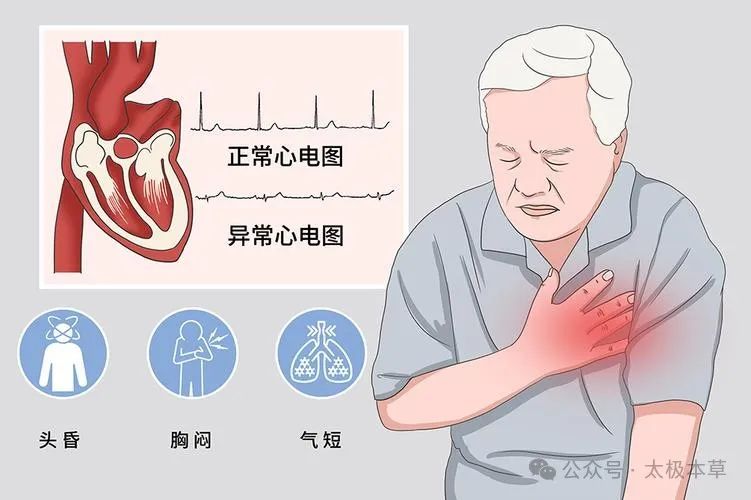

Ingredients: 6g of Zhi Ma Huang (Prepared Ephedra), 12g of Mai Dong (Ophiopogon), 18g of Dan Shen (Salvia), 12g of Wu Wei Zi (Schisandra), 10g of Gui Zhi (Cinnamon Twig), and 10g of Gan Cao (Licorice). Take one dose daily, decoct twice in water, and take one decoction in the morning and evening.
Indications: Heart and kidney Yang deficiency, leading to a slow and irregular pulse, palpitations, chest tightness, and shortness of breath. This includes modern medical conditions such as sick sinus syndrome primarily characterized by bradycardia.

2. For chest pain, add Yuan Hu (Corydalis) and Sheng Pu Huang (Fresh Typha) to invigorate blood and move Qi;
3. For chest tightness, add Gua Lou (Trichosanthes) and Xie Bai (Garlic Chives) to disperse phlegm and open Yang, or use Chang Pu (Acorus) and Yu Jin (Curcuma) to resolve depression and regulate Qi;
4. For dizziness, add Chang Pu (Acorus) and Ci Shi (Magnetite) to open the orifices and promote Yang;

Admitted to the hospital. Upon examination, ECG showed sinus bradycardia and arrhythmia, first-degree AV block, with a ventricular rate of 40 beats/min. Atropine test: positive, Western diagnosis: sick sinus syndrome. Initial diagnosis on September 20, 1982, with chest tightness and pain, shortness of breath, and dizziness.

Within an hour and a half, an increase in heart rate was observed, gradually decreasing after four hours. When using a large dose of Xi Xin (Asarum), as long as the method is appropriate, there were no adverse reactions except for a few individuals experiencing transient facial flushing.
Note: The prescriptions mentioned in the text should be used under the guidance of a qualified TCM practitioner.
Analysis of the ingredients in the formula:
Ren Shen (Ginseng)
【Properties】Sweet, slightly bitter, neutral.
【Meridians】Spleen, Lung, Heart.
【Functions and Indications】Greatly tonifies Yuan Qi, restores pulse, stabilizes collapse, tonifies Spleen and Lung, generates fluids, calms the spirit. Used for deficiency leading to collapse, cold limbs, weak pulse, Spleen deficiency with poor appetite, Lung deficiency with cough and wheezing, fluid damage with thirst, internal heat with thirst, prolonged illness with weakness, palpitations, insomnia, impotence, and cold uterus; heart failure, cardiogenic shock.
Huang Qi (Astragalus)
【Properties】Sweet, slightly warm.
【Meridians】Lung, Spleen.
【Functions and Indications】Raw: benefits Wei Qi and stabilizes the exterior, promotes urination and reduces swelling, expels toxins, and promotes tissue regeneration. Treats spontaneous sweating, night sweats, blood stasis, edema, and abscesses that do not drain or heal. Prepared: tonifies the middle and boosts Qi. Treats internal injury from overwork, Spleen deficiency with diarrhea, prolapse, Qi and blood deficiency, metrorrhagia, and all conditions of Qi deficiency and blood deficiency.
Xi Xin (Asarum)
【Properties】Acrid, warm.
【Meridians】Lung, Kidney.
【Functions and Indications】Dispels wind, scatters cold, promotes water metabolism, opens orifices. Treats wind-cold headache, nasal congestion, toothache, cough with phlegm, and wind-damp painful obstruction.
Fu Zi (Aconite)
【Properties】Acrid, sweet, hot, toxic.
【Meridians】Heart, Spleen, Kidney.
【Functions and Indications】Revives Yang and rescues from collapse, tonifies fire and assists Yang, disperses cold and eliminates dampness. Treats excess Yin, profuse sweating leading to Yang collapse, vomiting and diarrhea with counterflow, cold pain in the heart and abdomen, Spleen diarrhea with cold, edema, childhood convulsions, wind-cold-damp painful obstruction, spasms, impotence, cold uterus, sores, and all conditions of deep cold and chronic cold diseases.
Ma Huang (Ephedra)
【Properties】Acrid, bitter, warm.
【Meridians】Lung, Bladder.
【Functions and Indications】Induces sweating, relieves wheezing, promotes urination. Treats exterior excess in cold damage, fever with chills and no sweating, headache, nasal congestion, joint pain; cough and wheezing; wind-water edema, urinary retention; stubborn wind obstruction, skin numbness, and wind rash with itching.
Mai Dong (Ophiopogon)
【Properties】Sweet, slightly bitter, slightly cold.
【Meridians】Heart, Lung, Stomach.
【Functions and Indications】Nourishes Yin, generates fluids, moistens the Lung, and clears the Heart. Used for dry cough due to Lung dryness, consumptive cough, fluid damage with thirst, irritability and insomnia, internal heat with thirst, constipation; throat and diphtheria.
Dan Shen (Salvia)
【Properties】Bitter, slightly warm.
【Meridians】Heart, Liver.
【Functions and Indications】Invigorates blood and dispels stasis, calms the spirit, drains pus, and relieves pain. Treats angina, irregular menstruation, dysmenorrhea, amenorrhea, metrorrhagia, abdominal masses, blood stasis abdominal pain, joint pain, palpitations, and toxic swellings.
Wu Wei Zi (Schisandra)
【Properties】Sour, warm.
【Meridians】Lung, Kidney.
【Functions and Indications】Astringes the Lung, nourishes the Kidney, generates fluids, restrains sweating, and astringes essence. Treats Lung deficiency with cough, dry mouth and thirst, spontaneous sweating, night sweats, fatigue and emaciation, nocturnal emissions, chronic diarrhea, and dysentery.
Gui Zhi (Cinnamon Twig)
【Properties】Acrid, sweet, warm.
【Meridians】Bladder, Heart, Lung.
【Functions and Indications】Induces sweating and relieves muscle tension, warms the meridians and opens the vessels. Treats wind-cold exterior syndrome, shoulder and back pain, chest obstruction with phlegm, and menstrual disorders.
Gan Cao (Licorice)
【Properties】Sweet, neutral.
【Meridians】Spleen, Stomach, Lung.
【Functions and Indications】Harmonizes the middle, alleviates urgency, moistens the Lung, detoxifies, and harmonizes various herbs. Prepared: treats Spleen and Stomach deficiency, poor appetite, abdominal pain with loose stools, fatigue with fever, Lung atrophy with cough, palpitations, and seizures; raw: treats sore throat, peptic ulcers, abscesses, and detoxifies poisons and food poisoning.
